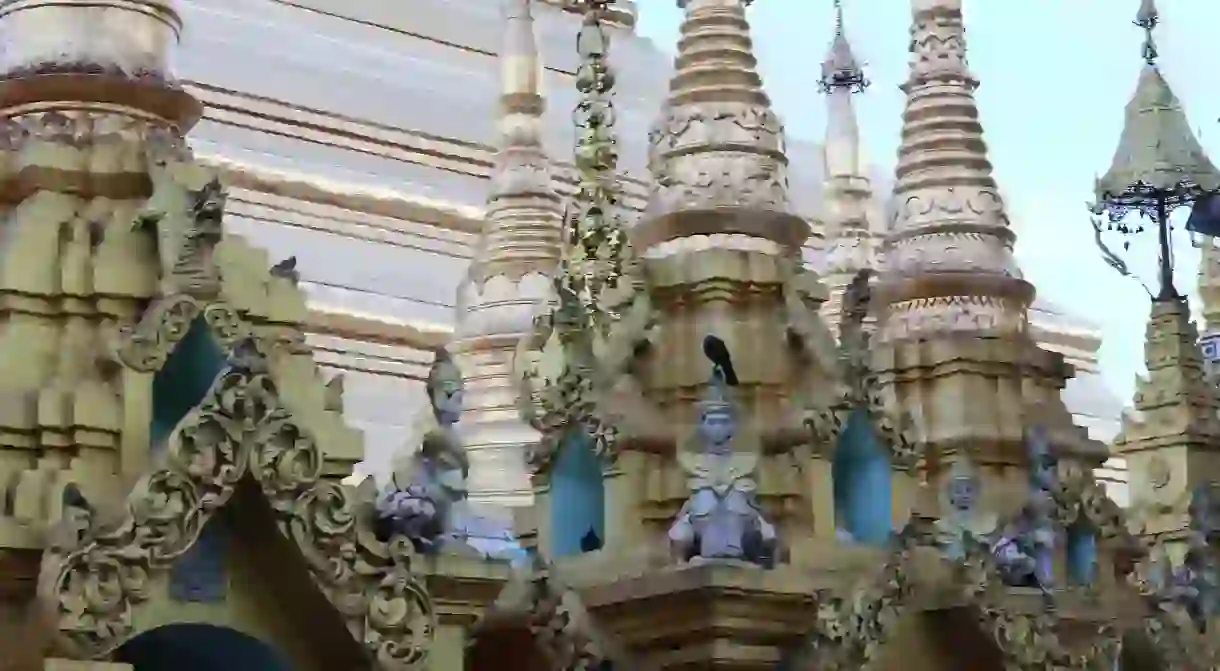The Most Unbelievable Temples and Pagodas to Visit in Myanmar

Oftentimes referred to as the Land of the Pagodas, the country of Myanmar has seemingly more of these religious structures than there are tourists actually visiting them. From the most neglected of temples in the heart of Bagan to the most frequented pagodas in the center of Yangon, here are the most unbelievable temples and pagodas to visit in Myanmar.
Shwedagon Pagoda, Yangon
Bridge, Park
The most stunning pagoda in Yangon is surely the Shwedagon Pagoda. It is over 2,500 years old and is one of the holiest relics in the country, as it apparently enshrines strands of Buddha’s hair. The Buddhist pagoda’s grounds are made up of hundreds of towering stupas and sculptures. In addition to tourists meandering the grounds, the majority of visitors are locals who come here to worship. One of the best spots to photograph the pagoda is from Kandawgyi Park across the lake, where visitors can stand on the wooden bridge and watch as the sun sets over its golden exterior. There is an 8,000 kyat entrance fee into the pagoda.
Shwesandaw Pagoda, Bagan
Made up of five terraces, the Shwesandaw Pagoda stands at almost 100 meters tall and is one of these most memorable Buddhist pagodas in the city of Bagan. Found in Old Bagan, it was constructed in 1057 by King Anawrahta. It is white in color and used to house hair relics of the Buddha. Entrance into the Bagan Archeological Zone is 25,000 kyat, but this allows visitors entrance into both Old and New Bagan for five days from the date of issue. Be sure to carry this card at all times, as officials are known to come check for these cards, especially at sunset.
Ananda Temple, Bagan
Buddhist Temple
The thousands of temples and pagodas in Bagan took some 250 years to construct in total. One of the most phenomenal of them all is the Ananda Temple, one of the largest and oldest temples in the entire city. Unfortunately, past earthquakes have left the temple in need of some major restorations and destroyed the temple’s golden spire, however, the temple is still stunning regardless. The revered Buddhist temple was constructed by King Kyanzittha, and its construction was majorly influenced by the Mon. The grounds of the actual temple is shaped like a Greek cross, and visitors can meander the curved ceiling corridors and view the four golden Buddhas housed inside the structure.
Sule Pagoda, Yangon
Located in the city center of historic Yangon is the Sule Pagoda, thought to be some 2,000 years old. It is one of the first structures visitors lay eyes on as they approach the city; the pointed form shimmers under the sunlight at midday and lights up after dark. It was rebuilt in the 1880s and stands at about 48 meters tall. The pagoda now sits in the center of the roundabout at Sule Pagoda Road and Mahabandoola Road, with a flow of traffic consistently circling its exterior. The spire is actually octagonal in shape and apparently houses a hair of the Buddha. There is a 3,000 kyat entrance fee.
Hsinbyume Pagoda, Mingun
Nestled along the western bank of the Irrawaddy River is the Hsinbyume Pagoda. This structure is so white visitors will find themselves not wanting to climb on it, as the pristine structure seemingly gleams from afar. No pagoda is more photogenic than this pagoda, found in the Sagaing region in Mingun. It was built in 1816 during the reign of King Bagyidaw of the Konbaung dynasty. There is no entrance fee into the pagoda.

Shwezigon Pagoda, Nyaung-U

Located on the outskirts of Nyaung-U is the Shwezigon Pagoda. It was constructed during the reign of King Anawrahta, who was also the founder of the Bagan Empire. The pagoda was completed, however, by his son, King Kyanzittha. The main stupa is 49 meters tall and 49 meters wide at its base with four smaller additional stupas around the pagoda’s edges.
Thatbyinnyu Temple, Bagan
Built in the 12th century, the Thatbyinnyu Temple is one of the most stunning temples in all of Bagan. It is lighter in color than most of the other religious structures with windows and doors that were added after its original construction; the structure reflects a distinguished Bamar style. It is the tallest temple in Bagan and can be seen from around the city, as it stands at a whopping 61 meters tall. The building itself is actually hollow, which is known as gu style. Be sure to knock on the temple with your knuckles to see for yourself.
Dhammayangyi Temple, Bagan
Buddhist Temple
The Dhammayangyi Temple is one of the largest and quite possibly the widest in Bagan. It was built in the 12th century during the reign of King Narathu, who apparently built the temple to make up for the many atrocities he committed during his lifetime, which included the murder of three of his family members. The temple has a gruesome past, as visitors can see small grooves in the exterior of the structure where workers apparently had fingers and limbs amputated if their work was not satisfactory. Construction of Dhammayangyi Temple was halted after the assassination of King Narathu and some believe the structure has bad karma. This is why it has never been chosen to have any large restorations in comparison to the other major temples and pagodas in Bagan. The structure is undoubtedly impressive, regardless of its dark past. The Buddhist temple houses a number of Buddha images as well as intricate mortar work.













